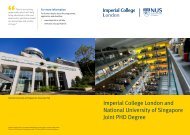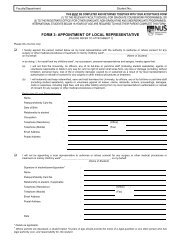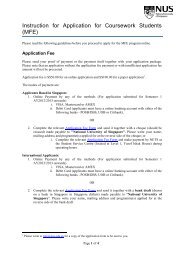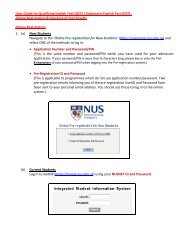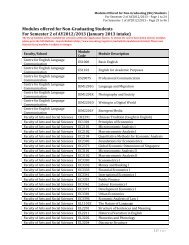engineering
engineering
engineering
Create successful ePaper yourself
Turn your PDF publications into a flip-book with our unique Google optimized e-Paper software.
Modules<br />
Marketin g (Biz):<br />
MKT3418 Product and Brand<br />
Management<br />
Applied Mathematics(FoS/FASS):<br />
EC4311 Mathematical Economics II<br />
MA3253 Inventory & Queuing Models<br />
MA4260 Model Building in Operations<br />
Research<br />
Systems Engineering (FoE/SDE):<br />
IE2110 Operations Research I<br />
IE2140 Engineerin g<br />
Economy<br />
PF3101 Project Scheduling & Control<br />
Number<br />
Of Mcs<br />
Management of Technology (FoE):<br />
MT5003 Creativity and Innovation<br />
MT5005 IP Law for Engineers &<br />
Scientists<br />
12 Modules 48 MCs<br />
A student who has been awarded the Major in<br />
Management (Technology) would not have the Minor in<br />
MOT awarded.<br />
3.5.6 Student Exchange Programme<br />
The Student Exchange Programme (SEP) provides an<br />
opportunity for students to study at more than 160<br />
universities in 32 countries. These include premier<br />
institutions in North America, Europe, Asia and<br />
Australia. Please refer to:<br />
http://www.eng.nus.edu.sg/sep/universities.htm for a list<br />
of partner universities available to Engineering students.<br />
SEP offers students exciting opportunities to get fresh<br />
perspectives on the subjects that they study, to<br />
experience foreign cultures and to forge friendships<br />
across borders. They gain maturity, confidence,<br />
independence and an ability to work with people of<br />
different cultures. Some students will also get a chance<br />
to develop new language skills that may serve them<br />
well in future careers.<br />
Students are normally selected for SEP during Year 2<br />
and embark on exchange for a semester during Year 3.<br />
Students design their own study plans by selecting<br />
modules offered by partner universities and mapping<br />
them to equivalent modules offered at NUS. The grades<br />
achieved while on SEP are not included in the CAP<br />
calculation.<br />
For more information on the Student Exchange<br />
Programme, please visit: http://www.eng.nus.edu.sg/sep<br />
4. Undergraduate Education (Part-time<br />
Programmes)<br />
4.1 Bachelor of Technology Programme<br />
4.1.1 Overview<br />
From AY2010/11, the Faculty of Engineering offers parttime<br />
programmes leading to the degree of Bachelor of<br />
Technology (Honours) [i.e., B.Tech. (Hons.) degree] in:<br />
• B.Tech. (Chemical Engineering)<br />
• B.Tech. (Electronics Engineering)<br />
• B.Tech. (Industrial & Management Engineering)<br />
…235…<br />
• B.Tech. (Manufacturing Engineering)<br />
• B.Tech. (Mechanical Engineering)<br />
These part-time programmes are specially designed and<br />
primarily meant for diploma holders from the local<br />
polytechnics who wish to study for a high-quality<br />
<strong>engineering</strong> degree without having to leave their fulltime<br />
jobs. These courses are specially designed for such<br />
students to prepare them to better meet the challenges<br />
of a knowledge-based economy. The academic standard<br />
at graduation of the B.Tech. degrees are meant to be<br />
on par with that of the Faculty’s well established fulltime<br />
B.Eng. degrees. The B.Tech. courses follow closely<br />
the curriculum of the B.Eng. courses and makes use of<br />
the same high quality teaching staff and teaching<br />
facilities.<br />
4.1.2 Admission Requirements<br />
The minimum requirement for admission to any of the<br />
B.Tech. courses is a relevant diploma from a local<br />
polytechnic, or equivalent local/foreign qualifications. In<br />
considering an applicant’s suitability for admission,<br />
factors considered include:<br />
• Performance in the diploma course.<br />
• Relevance and length of work experience.<br />
• Company sponsorship.<br />
• Other evidence of post-diploma academic preparation<br />
including the advanced diploma and any other<br />
mathematics and foundational <strong>engineering</strong> courses.<br />
Applicants may also be required, by the committee on<br />
admission, to sit for admission tests to determine their<br />
suitability in coping with the demanding B.Tech.<br />
courses.<br />
4.1.3 Curriculum Structure and Degree Requirements<br />
The structure and design of the B.Tech. courses are<br />
based on that of the four-year full-time B.Eng. courses<br />
offered by the Faculty of Engineering. However, unlike<br />
other <strong>engineering</strong> degree courses which cater primarily<br />
to students admitted with GCE ‘A’ Level qualifications,<br />
the unique feature of the B.Tech. Programme is that<br />
the curriculum structure and design of the modules are<br />
specially tailored to suit the needs and background of<br />
polytechnic graduates holding relevant full-time jobs in<br />
industry. This is possible because all its students would<br />
have a polytechnic diploma, or its equivalent, and<br />
working experience when they are admitted. As such,<br />
although almost all the upper-year modules are identical<br />
to those of the full time B.Eng. courses, the modules in<br />
the earlier years are somewhat different and are<br />
specially designed to cater to the different needs of the<br />
B.Tech. students.<br />
The B.Tech. curriculum structure follows the normal 160<br />
MCs four-year full-time programmes. As all students<br />
admitted into the B.Tech. Programme must have the<br />
minimum of a recognised polytechnic diploma, all<br />
students are granted, upon admission, advanced<br />
placement credits of 40 MCs, which is equivalent to one<br />
year of the four-year full-time courses. These include<br />
a) 8 MCs of University Level Requirements (ULR),<br />
b) 20 MCs of Programme Requirements, and<br />
c) 12 MCs of Unrestricted Elective Modules (UEMs).<br />
GI GI<br />
FASS FASS<br />
BIZ BIZ<br />
SoC SoC<br />
FoD FoD<br />
SDE SDE<br />
FoE FoE<br />
NGS NGS FoL<br />
YLLSoM FoL FoL<br />
YLLSoM YLLSoM YSTCM<br />
FoS<br />
USP<br />
DUKE-NUS<br />
LKYSPP<br />
YSTCM YSTCM NGS<br />
TI TI<br />
Others Others



